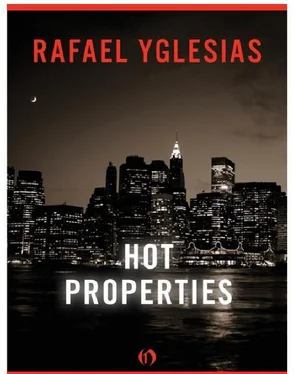A middle-aged man dressed in a drab summer raincoat appeared next to the table seconds later. Gott handed him the check. David felt scared. He swallowed hard and began to worry that this Gott was more than merely a hunted old man — that he could still do harm. “He will dispose of the check as we talk,” Gott said while his associate walked away. “Until he returns I won’t be reassured enough to discuss important matters.”
Chico asked if he had had plastic surgery.
“I am myself,” Gott said. David wrote it down: good quote for an ironic last line. He began to feel some of the excitement that Chico had been full of — this was going to be a knockout story. The entire journalistic world would envy him his seat at the coffee table. Later he would come down and take notes on the decor — the details of its mediocrity would contrast nicely. “No one glancing into the hotel coffee shop and seeing three gentlemen hunched over their coffee would suspect that one of the great criminals in …”
“I don’t want to give details — dates and so on — of my recent movements,” Gott said. “Is this man your secretary?” he asked, nodding at David as though he were mute and couldn’t answer for himself.
“No,” Chico answered. They were both nervous that Gott would find out David was Jewish. It had been decided not to introduce themselves beyond first names, to let Chico ask all the prepared questions (David was to come in only if he felt Chico had missed an opportunity), and not to explain their positions at the magazine. “Why have you decided to tell your story now?”
“To get rid of the lies about me and Mengele!” Gott’s attempt to yell came out as a rasp of irritation. “They become more fantastic every day — the things they say we did. Ridiculous.”
“I thought the accusations had been consistent,” Chico said.
“Ah!” Gott said, waving his hand in disgust.
“In our files, we haven’t come across anything new.”
“The victors write history, my friend,” Gott said. “Files can be altered. Made to look consistent. Everybody does it. It is so easy, when a man is silent, to say what you like about him. But there is no proof! Everything is exaggerated.”
So it would be garbage, David thought, looking down, ashamed. His eyes fell on the partially serrated stainless-steel knife resting nude on the Formica table. Unable to question Gott at length, it was obvious they would be left with an interview that would consist of denials. Other than the pure sensation of having an interview with him, there would be no news in this story — nothing of real benefit to history. The fact of the event would be news, not what David contributed. I was there, he could say, and go on pompously about his feelings. The knife was there. In a moment it could be in the old man’s heart. That would be real news. History. Justice. Fulfillment.
But the knife was flimsy — probably it would bend comically, or its dull tip would fail to penetrate, and if he plunged hard enough, it might rebound and take out Chico’s eye.
He could decline to write the piece.
He could—
“Gott?” a woman’s voice asked. David glanced up and saw Gott’s small head turn to the side. Chico’s large body, leaning forward to ask questions, had cut off David’s view of her, but in her hand, emerging from a coat, he saw the long black nozzle of a gun.
“No,” he heard the rasping voice say.
She spoke in the language of the holidays, softly, like his mother reciting a prayer while she lit Hanukkah candles.
And then the world ended. Something splashed on his face. The noise was ghastly, screeching at the world, filling it with sound. The Formica table was streaked with elegant lines of blood. Gott’s head seemed to move on its own, trailing goo like a jet’s tailstream, disappearing under the table’s horizon.
Horror roared in David’s brain — he leapt up, his thighs banging hard against the table. Crowds shouted at him, and in his brain he was screaming for mercy. Chico seemed stuck in place. David pulled himself up onto the booth. She stood at the edge of the table, sweet and demure, and pointed the gun down at the fallen old man, firing into his already lifeless body. She spoke again, screaming this time, in Hebrew.
“I’m a Jew!” David shouted, crying to her like a frightened baby. “Don’t shoot me! I’m a Jew!”
Marion frowned at Fred. “What’s bothering you?”
“I told you. I’m making these guys a fortune!” He paused to see if this astonishing fact registered. She stared back stupidly. “A fucking fortune! And Bart turns down offers without telling me, sets up my next book with Bob and I’m barely consulted—”
“Why did you sign the contract, then?” She shook her head. “I don’t get it. You just got angry about this?”
“He doesn’t think I can write a book without Bob.” Fred said, admitting this to himself fully for the first time.
“Bart? Oh, come on.”
“He doesn’t. Because of the rewrite.” Fred closed his mouth, kneading his lips in and out. He wanted to shut himself off, stop talking about it. He was rich. Soon he would be famous. Shut up already.
“Everybody makes changes for their editor. I’m sure Bart thinks Holder is useful because of the marketing. He’s done a great job selling your novel — you have to give him that.”
“Goddammit. Can’t you, my wife, at least give me credit for writing a good book—”
“Fred!” Marion stood up. “I can’t take this. You’re not happy when you can’t sell a book. You’re not happy when you do sell a book. You’re not happy when you can’t write. You’re not happy when you can. You’re scared the book won’t succeed. And now you’re not happy when the book is a success? It’s insane!”
Fred laughed. She was right. “You know me so well.”
“That’s right. And you’re damn lucky to have me. ‘Cause from now on no one’s gonna tell you when you act like an idiot. You’re too successful to criticize.”
He carried her statement with him into the world, like a photo in his wallet, to remind him of home. Now when he went to Karl’s poker game, he was greeted enthusiastically. Karl. Tom, and even Sam Wasserman (who had once threatened to leave the game if Fred continued to attend) all asked him to read their works in progress. They stopped the game to listen to his account of having lunch with the Book-of-the-Month Club people, they asked if he planned to adapt his novel to the screen, and hooted down his honest reaction — that he doubted he would be asked to.
He took out Marion’s sentence and looked at it: they once despised me, he repeated over and over. Their performance of admiration and deference was so convincing, so seductive, that he found himself wondering: maybe when they read the book (he had had advance copies sent to them) they realized how wrong they were.
After the game, Sam Wasserman asked him if he wanted to share a cab since they were both going in the same direction. That had been true for the last two years, but Sam mentioned this geographical marvel as though it had only now occurred to him. Fred agreed and also accepted Sam’s invitation to come upstairs for a drink. They tiptoed past the bedroom (Sam’s second wife was asleep in there; his first now lived in Great Neck) into the study, where Sam poured cognac.
“Writers are so competitive,” Sam commented, staring at his snifter.
“Yeah — the game gets pretty loud.”
“No, I wasn’t thinking of the game.” Sam drained his glass in a quick motion. “I was thinking of Tom Lear. You have to watch out for him. He fights dirty in the clinches.”
“Really? Tom’s always been great to me. Very supportive of my book before anybody else.” That was the closest Fred had come to chiding Sam for his earlier rejections.
Читать дальше












